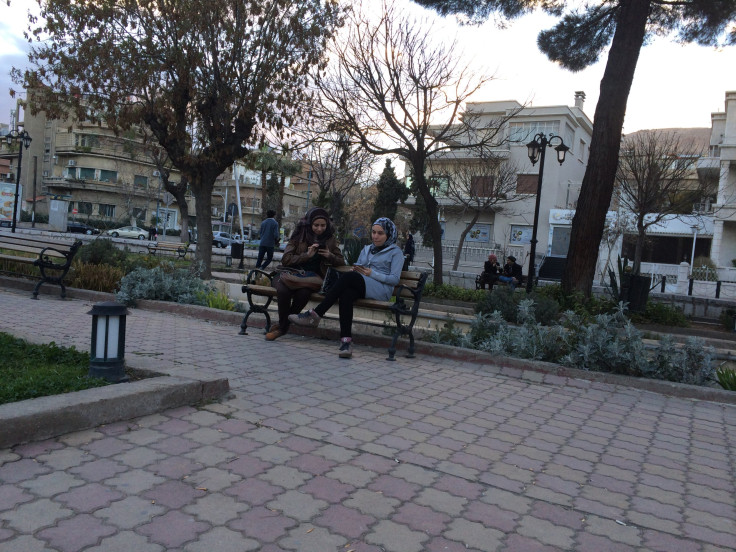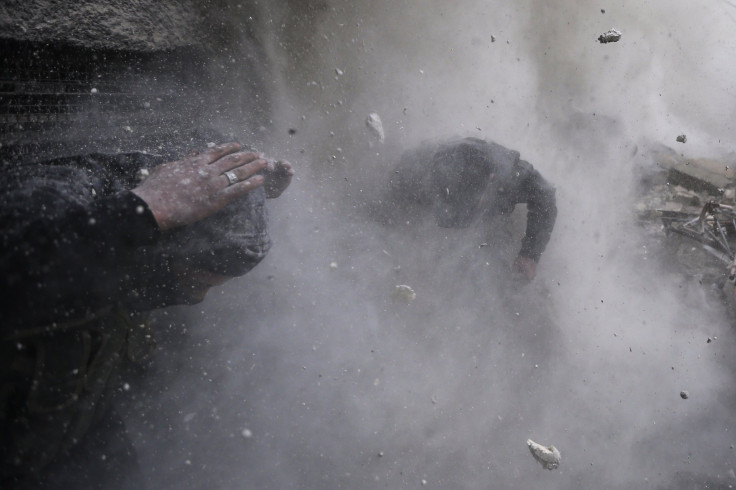Candy Crush Mobile Game App Provides Much-Needed Distraction For War-Weary Syrians

DAMASCUS, Syria -- Suhail has a small addiction and feels no shame about it. Every day, the stay-at-home mother of four quickly finishes her household chores so that she can “sit down and play Candy Crush.”
“It’s my time. My hour. I’m hooked, and I love it,” she says as she offers her guests coffee in her living room. She is referring to one of the cell-phone games that are popular these days among ordinary Damascenes in the war-torn city.
The average person in the Syrian capital has a few such games downloaded on his or her cell phone, and people can be seen playing solo while doing all sorts of things, like walking down the street, sitting in traffic at checkpoints, or waiting to see the dentist.
Suhail sometimes plays the game at the expense of tending to her 2-year-old daughter. Or so her sister alleges.
“The other day I saw this with my own eyes,” says the sister, half-heartedly confronting Suhail. “You were so busy playing, and your baby wanted to go potty, and instead of putting down your game and taking care of your child, you told Lara to take care of the baby and you just kept playing,” she adds, referring to Suhail’s 8-year-old daughter, who sometimes helps care for the toddler.
Suhail seems unfazed by the accusation, and in a twist of irony, her cell phone rings right at that moment. It's a friend asking if Suhail has received her request “to send an extra life or two” for Candy. The game sometimes freezes out a player for hours unless a fellow player sends “a life” -- an exchange that takes place on Facebook.
“Yes, yes, I’ll get it to you. Don’t worry, I haven’t forgotten,” Suhail tells her friend over the phone. A few moments later, she excuses herself from her guests to send “the lives.”
“Sorry, but it’s urgent,” she explains, looking sheepish.
When she returns a little while later, her sister gently reprimands her for abandoning the guests, to which Suhail replies, “Oh, c’mon. For three years our life has been nothing but boom and bang, death and destruction and terrible news every day. Let me have my little escape to Candy Crush. At least no one really dies there.”
Everywhere these days it seems that Damascenes are trying to escape into virtual realities. They immerse themselves in these games, sometimes even at the risk of running into trouble with the authorities.
There is Nada, a young grandmother who works part-time as a translator. She does not waste a minute of “precious Candy time,” explaining that she is trying to get to the next of the game's 350 levels. (Like Suhail, she says “Candy Crush,” though often the game being played is a knockoff called “Candy Crash.”)
During a recent commute to work, Nada finds herself stuck in traffic, awaiting her turn at a government checkpoint, so she pulls out her cell phone and starts playing Candy. She mumbles that she’s too busy to explain exactly how the puzzle game works, which involves moving candy icons around. “I’d better finish it now because I’ve been trying to finish it for days and I don’t want to... oops,” she says suddenly, looking up. It is her turn to pass through the checkpoint, and she has to hide her cell phone from the armed guards, “or I’ll get an earful from him like last time. Once, I saw him make a driver pull over and wait until God-knows-when, just to punish him for being on the phone at a military checkpoint. There’s no joking with these guys,” she says, quickly shoving her phone into her purse.
As her observation at the checkpoint makes clear, men similarly give in to the lure of the games. Among the popular ones is Subway, which random men in public spaces can be seen playing as they wait their turn in line at the bank or while riding public transport.
Abdo, a 23-year-old professional driver, has another favorite game that he plays every chance he gets while driving, such as when he’s stopped at a red light or stuck in traffic.
“It’s about a car race, see?” he says, showing a virtual racecar on a track on the screen of his cell phone. “So, when I’m not driving my real car, I’m driving this car.”
None of this was common before Syria’s uprising-turned-civil war began in March 2011, when few Damascenes had any experience with cell-phone games. Now, the insanely popular and addictive phenomenon Candy Crush -- which reportedly has 93 million users worldwide and raked in just under $1 million a day in 2013 -- offers respite in one of the most painful corners of the world, where more than 100,000 people have been killed by bombs, bullets and chemical weapons in the past three years.

Some Damascenes say playing the games is a good way to fill the void left by so many loved ones who have perished, disappeared or been displaced to other cities, countries or refugee camps.
One 75-year-old widow who used to enjoy a thriving social life within a community of healthy widows laments the fact that she has lost many friends to displacement during the past couple of years.
“They’ve all moved. Some to Beirut. Some to Dubai. Some to the U.S. Nobody is left here,” she says. But that has not stopped her from staying in touch through Skype, which she was determined to learn though she had never before used a computer. Skype gave way to Facebook and soon Facebook gave way to games like virtual farming, which her widow friends also play.
For some, the recent discovery of these free games has taken on a personal dimension.
Yahya and Suad, a married couple in their mid- to late 30s, have been trying to conceive for several years. Before the war, they were trying in-vitro fertilization at a local fertility clinic in Damascus.
“But we’ve put all that on hold because of the war,” said Yahya, adding that his private business as a physical therapist has suffered, and money is now tight.
During a casual outing with him, his cell phone keeps making strange noises that resemble something like a kitten or a bird. Asked to explain, he smiles, looks slightly embarrassed, then pulls out his phone and shows “My Tom” on his screen.
“He’s a cat. And he needs to be fed and bathed and put to sleep, so he complains when you don’t do it,” Yahya says. “He also needs to have his belly rubbed. See?” The virtual cat began to purr.
“It was my wife’s idea. She really likes him, and I just go along with it,” he says, blushing.
Surrounded by a tense war, many Damascenes also revert to what they seem to do best: satire. But the days of socializing and cracking jokes late into the night are long gone, thanks to a general fear of staying out after dark and to dwindling numbers of friends. Instead, many share their jokes on social media.
The latest joke superimposes the local geopolitical situation onto the news of violence and protests from Kiev, Ukraine, where scenes of destruction eerily resemble some of the early demonstrations in Syria.
The photo is of Hezbollah’s chief, Hassan Nasrallah, who sent his Lebanese militias months ago into a Damascus suburb to “guard the shrine of Lady Zeinab against terrorists” – terrorists being a stock reference used by the Syrian government and allies such as Hezbollah to describe Syria’s rebels. The move intensified sectarian tensions between the predominantly Sunni Muslim rebels and Shia Muslims, represented here by Hezbollah.
“We’re sending our militia to guard the shrine of Lady Natasha,” lampoons the photo, which shows Nasrallah in a heated pose juxtaposed with a picture of the embattled Maidan Square in Kiev.
Still, it seems that no matter what Damascenes do, there is no escaping their grim reality. Just as people chuckle at Hezbollah’s joke, circulated on social media like WhatsApp, the Syrian authorities send out their daily barrage of text messages to all Syrian cell-phone users.
“Put down your weapons immediately,” the messages warn. “The Syrian Army is coming, and it shall be victorious.”

© Copyright IBTimes 2024. All rights reserved.





















